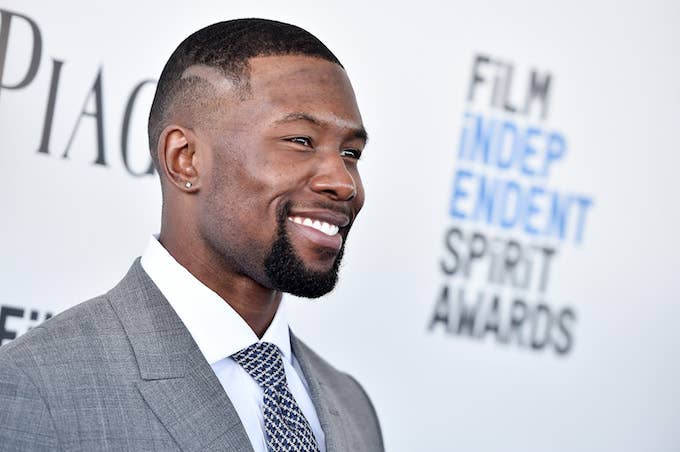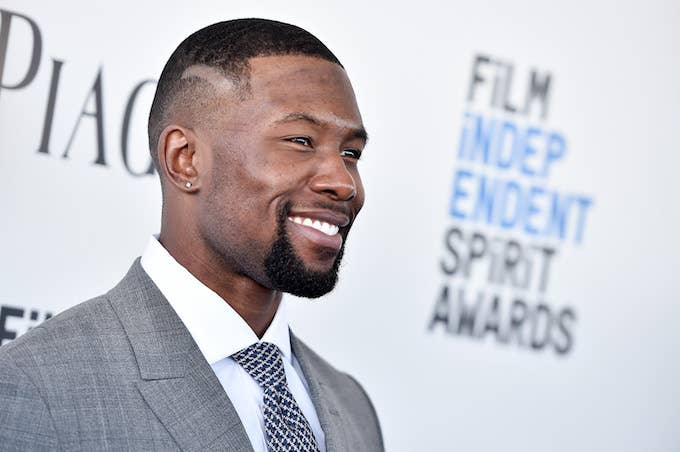
“I’m forever on cloud nine because of that moment,” Trevante Rhodes says. You'd be too if something you contributed to made a recent entry to the record books.
The actor will never forget what transpired at the 89th Academy Awards, and not because of its calamitous ending. The 27-year-old played grown Chiron in Barry Jenkins's remarkable Best Picture winner, Moonlight—the one who hid his insecurities behind a cool pose. The one who hid his struggle with his sexuality behind muscle. But Chiron's eyes have always communicated far more than he was able to verbally, especially in Moonlight's final act—a testament to Rhodes's command of the subtle. Not bad for someone who didn't get into acting until his senior year at the University of Texas at Austin.
In just a matter of months, the former track and field star went from a cameo on Westworld to history. And with Moonlight winning three Oscars and on DVD now, Rhodes's performance is receiving an even larger, deserved audience. It'll make him better known when he appears in Shane Black's reboot of The Predator next year.
A week after the Oscars, we revisited its conclusion, discussed toxic masculinity and his bright future.
First off, congratulations. It’s been about a week—has the weight of the moment set in, yet?
[Laughs] I don’t think it ever will, to be quite honest. What we do for a job, first and foremost, is insane. It’s not normal. And then to get some kind of award, some kind of global love for something you did and ending up loving so very much, that’s just insane. There’s no way you can ever sit there and say, “Okay, this is normal.”
I saw the picture of you clutching your chest. In that moment, you were many of us. Can you walk me through the emotional rollercoaster?
As soon as La La Land was announced, we were happy for them because we met a group of people we had the opportunity to learn from and grow with throughout the entire awards cycle. And then, as I’m sitting next to André Holland, I see this person who doesn’t belong on stage walking onto the stage and you could see remorse on his face. I look at André like, “Something’s about to happen.” He makes his way to the front, and there’s this moment where Jordan Horowitz comes to the microphone and says “Moonlight is the winner.” At first I thought he was just being nice and trying to share the moment with us because we have that relationship, but there was something in his tone that let me know he was serious.
So I ran to his stage and I looked at Mahershala [Ali], and I just hugged him because it hit me: we really won. In that moment, I was 100% ecstatic for La La Land, but if you could fathom that 100% becoming 200% in being happy for us, that’s how it felt. And it was just a shock, because how does that happen? How is that possible at this level, and for it to be—I don’t want to say the most important award—the night’s grand finale. You have a moment where you ask yourself, “Is this real? Am I being punk’d? It was just the weirdest cycle of emotions.
Are you bothered by the fact that Moonlight’s moment will always be associated with this massive error? Because your moment in history shouldn’t be bound to that.
I think that if you attach so much weight to the award...it’s a huge thing and it helps promote the film, but I think this will lead to more people seeing the film—which is the most important thing: having people see this thing that we’re all very proud of, that I think is life-changing for people. But to say that it takes away from the gravity of the moment—well, it does, but I don’t really care. I care more that people are going to see the project. That’s more important than having a moment on stage.
You and Barry did an interview last year where he said he figured it would take some time for the Academy to fix its diversity issues. Moonlight winning Best Picture isn’t going to change that immediately, but it’s definitely a big step in the right direction, isn’t it?
I really think it’s going to prompt the industry to want to see and invest in more of these really finite stores. Obviously people want to see very specific stories, and this awards season has shown that there’s so much universality in the specific. I think us winning Best Picture just amplifies the idea that much more, so I think [people] are going to want to cash in on that now.
My favorite scene is the diner scene, because Chiron’s mask just crumbles in Kevin’s presence. And that’s all in your facial expressions. One of the more absurd criticisms I’ve heard of Moonlight is that there “isn’t enough dialogue.” But acting involves action. Did your ability to convey Chiron’s inner-turmoil non-verbally come from the discipline you developed as a high-level athlete?
Honestly, I couldn’t tell you where it came from. I wish I could say it came from that, but honestly, I think it just came from empathy. From caring about people, watching people, and paying attention to them. Whenever you see someone who’s having a rough day, it’s one thing to ask if they’re okay, because most people would just walk by. That can be life-changing to that person who’s going through whatever they’re going through. I’m that kind of person, so that’s been my training for acting: just caring about people. And I think that’s the best training, aside from having a great director and storyteller who can help you translate it into a story.
Since last week, I’ve had a lot of people ask, “Well how gay is Moonlight before I watch it?” Or even allege that it’s an “attack on heterosexuality that’s pushing a gay agenda.” Do you think the film is simply too nuanced for some to digest?
Yeah, I do. Well, I don’t want to belittle people. I think anyone who goes into it unable to have an open mind or heart needs to see it, because they’re the ones putting up a facade. That’s the person who needs to allow themselves to receive the film so they can have that real moment of truth. I think people who ask, “Well how gay is it?” are worried about how other people will see them if they do enjoy the film. And that’s kind of the context of Moonlight, so they need to see it more than anyone else.
So, sharp pivot to the Calvin Klein campaign. Pretty well-timed. Did you know that would be running the day after the Oscars?[Laughs] We knew that it was gonna run within the next week, but I didn’t know it was coming the day after. But after the Oscars, it was like, of course. We won Best Picture and then they dropped that? The moment has been fully maximized.
You’ve done Burning Sands and you finished Horse Soldiers, but you’re also worked on Terrence Malick’s Song to Song. I know you’ve said you aren’t even sure if you made the final cut, but it was still one of the first films you worked on. What was it like working with Malick?
I did that back when I was still in college in Austin. That was the first thing I had lines in. Working with Terry was really unique, because he knew my name. I did two days of work, and he came up to me after both days and said, “Thank you Trevante for your contribution.” He was really soft-spoken and I didn’t really know the gravity. Fast forward five years and everyone’s talking about how amazing the film is, but I didn’t understand the levity and context of the moment at the time. I hope I’m in it, because I’m working with Boyd [Holbrook] and he had like a week on Song to Song’s set and feels the same way. We’re crossing our fingers right now, but that experience was really unique. It set the tone; that’s really where I got the acting bug.
So you’re working on The Predator right now. What can you say about this one?
I don’t know how familiar you are with Shane Black’s work, but he’s really stylish and has a very unique method of telling stories—kind of a nod to the old action, comedy, buddy-buddy films. If you imagine that tone within the world of Predator, it’s a special fit. It’s everything I thought it could be, and then some, because Shane is a mastermind. Each day, we have a new experience putting our heads together and finding ways to stretch the script and push the boundaries. It’ll be a really cool experience for fans of the Predator series and fans of Shane Black. He had a part in writing the original film and he was in the original film, so he’s part of this franchise. It means a lot to him and I’m lucky to be involved.

